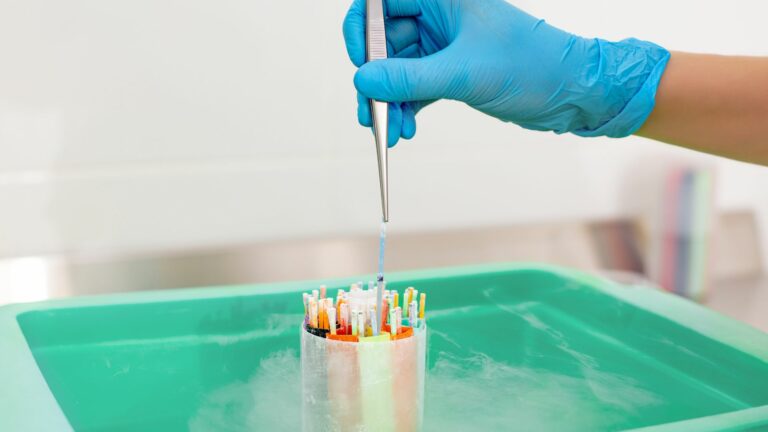
In vitro fertilization (IVF) has revolutionized the treatment of infertility in India. However, its success depends on various factors, including a properly functioning immune system.
Immune system imbalances can sometimes hinder IVF success or contribute to pregnancy loss. Understanding the role of immunological factors empowers couples navigating their IVF journey.
Key Takeaways
| Takeaway | Description |
|---|---|
| 1. Autoimmune disorders | Conditions like thyroid problems, lupus, rheumatoid arthritis, and tuberculosis can affect fertility |
| 2. Natural killer cell activity | Overactive NK cells may interfere with embryo implantation or cause early miscarriage |
| 3. Antiphospholipid syndrome | This clotting disorder can disrupt blood flow to the placenta, increasing miscarriage risk |
| 4. Testing options | Blood tests, NK cell assessment, antiphospholipid antibody screening, and HLA typing can diagnose immune issues |
| 5. Tailored treatments | Approaches may include medications for specific conditions, IVIG, steroids, blood thinners, or IVF protocol adjustments |
| 6. Holistic care | A healthy diet, stress management, moderate exercise, and complementary therapies can support immune health during IVF |
Initial Data Analysis
Understanding Immunological Infertility
Several types of immune system issues can impact IVF success:
- Autoimmune disorders: When the immune system mistakenly attacks the body’s own tissues, it can lead to conditions that may interfere with fertility:
- Thyroid disorders, both underactive (hypothyroidism) and overactive (hyperthyroidism), are relatively common in India and can disrupt ovulation and increase miscarriage risk.
- Systemic lupus erythematosus (SLE) causes widespread inflammation, potentially affecting reproductive organs.
- Rheumatoid arthritis is associated with increased risks of pregnancy complications.
- Tuberculosis, while primarily affecting the lungs, can spread to the reproductive tract, especially in Indian women where TB prevalence remains significant.
- Elevated natural killer (NK) cell activity: NK cells normally fight infections and abnormal cells. However, if they become overactive, they may target a developing embryo, hindering implantation or leading to early pregnancy loss.
- Antiphospholipid syndrome (APS): This autoimmune clotting disorder can interrupt blood supply to the placenta, contributing to recurrent miscarriages.
- Anti-sperm antibodies: In some cases, antibodies can develop against sperm, impacting male factor infertility.
It’s crucial to consult with a qualified reproductive immunologist for accurate diagnosis and management of suspected immune-related infertility. What has your experience been with seeking specialized care for immune factors?
Testing for Immune Factors in India
To identify immune issues that may be impacting IVF success, a reproductive immunologist can recommend specific tests:
| Test | Description |
|---|---|
| Blood tests for autoimmune markers | Checks for antibodies associated with various autoimmune disorders |
| NK cell activity assessment | Measures NK cell levels and activity (interpretation requires expertise) |
| Antiphospholipid antibody testing | Screens for APS-related antibodies |
| HLA typing | Evaluates tissue compatibility between partners, which may be relevant in recurrent implantation failure or miscarriage |
Action plan for patients:
- Discuss immune testing with your fertility specialist if you’ve had recurrent IVF failures or miscarriages.
- Request a referral to a reproductive immunologist. The Indian Fertility Society and Indian Society for Assisted Reproduction provide directories of qualified specialists.
- Gather relevant medical records and family history to aid the immunologist’s assessment.
- Prepare questions about recommended tests, result interpretation, and retesting.
Keep in mind:
- Test availability may vary between clinics. Speciality centres often offer more comprehensive testing.
- Insurance coverage for immune testing can differ based on your specific plan.
- Test results must be interpreted in the context of your complete medical history.
Exploring immune factors as a potential cause of IVF challenges is an important step. For a detailed overview of what to expect during the IVF process, check out our comprehensive guide.
Treatment Options for Immune-Related Infertility
If immune system issues are identified, a personalized treatment plan will be developed by your care team. Potential approaches include:
Targeting specific conditions:
- Thyroid medication to regulate thyroid function
- Carefully considered immunosuppressive drugs for severe autoimmune disorders impacting fertility
Addressing elevated NK cell activity:
- Intravenous immunoglobulin (IVIG) therapy to modulate the immune response
- Steroid medication like prednisone to suppress immune overactivity
Managing antiphospholipid syndrome (APS):
- Blood thinners (heparin or low-dose aspirin) to prevent clotting and improve placental blood flow
Overcoming anti-sperm antibodies:
- Steroid therapy
- Intrauterine insemination (IUI)
- IVF with intracytoplasmic sperm injection (ICSI)
Additional IVF considerations:
- Intralipid infusions to potentially modulate immune activity (efficacy still under study in India)
- Preimplantation genetic testing (PGT) to identify chromosomally normal embryos, especially with recurrent IVF failures
Action steps for patients:
- Openly discuss treatment options, success rates, side effects, and costs with your doctor.
- Consider obtaining second opinions, particularly for less common therapies like IVIG or intralipids.
- Connect with Indian fertility support groups focused on immune factors for shared experiences and advice.
Remember:
- Some immune treatments are still being actively researched to establish efficacy.
- Not all diagnosed immune issues will require intervention. Close monitoring with your immunologist is key.
- If using immunosuppressive medications, extra vigilance is necessary.
Coping with an immune-related infertility diagnosis can feel isolating. Many find solace in support groups where they can share their struggles and triumphs with others who truly understand. Have you found connecting with fellow IVF warriors helpful?
To supplement medical interventions, consider diet and lifestyle adjustments that can promote overall reproductive health. Small changes can make a big difference on your journey to parenthood.
Optimizing Overall Health for a Successful Pregnancy
While targeted treatments address diagnosed immune issues, promoting overall well-being is equally important for IVF success:
Balanced diet:
- Eat a variety of fruits, vegetables, whole grains, and lean proteins for essential nutrients that support immune health.
- Consult a registered dietitian specializing in fertility for personalized meal planning.
Stress management:
- Practice stress-reducing techniques like yoga, meditation, and deep breathing to mitigate the negative impact of chronic stress on immune function.
- Explore fertility-focused yoga classes offered at studios or online.
Regular exercise:
- Engage in moderate exercise most days of the week to manage stress, improve circulation, and promote overall well-being.
- Discuss any new exercise plans with your doctor, especially if you have pre-existing health conditions.
Fitting in self-care during IVF can be challenging. What stress management strategies have worked best for you? Share your tips in the comments!
Complementary Therapies: A Note of Caution
Some individuals explore complementary therapies alongside conventional medicine for immune health and fertility support. However, it’s crucial to manage expectations:
| Therapy | Considerations |
|---|---|
| Acupuncture | Studies on its effectiveness for infertility have yielded inconclusive results |
| Ayurvedic practices | Limited research supports the use of Ayurvedic herbs or techniques for immune-related infertility |
Important nuances:
- Complementary therapies should not replace evidence-based medical treatments for diagnosed immune issues.
- Discuss any complementary approaches you’re considering with your doctor to ensure they don’t interfere with your treatment plan.
While alternative medicine may offer relaxation benefits, it’s essential to prioritize scientifically-validated interventions. For an in-depth look at integrating Ayurveda with IVF, refer to our comprehensive guide.
The Emotional Impact of Immune-Related Infertility
Receiving an immune-related infertility diagnosis can be emotionally challenging. It’s normal to experience a range of feelings, including:
- Frustration and anger
- Sadness and grief
- Anxiety about treatment outcomes
- Isolation and loneliness
Remember, you’re not alone in this journey. Seeking support from mental health professionals experienced in working with fertility patients can be incredibly helpful.
They can provide coping strategies and tools to navigate the emotional ups and downs of IVF.
If you’re struggling emotionally, don’t hesitate to reach out for help. You deserve support and understanding during this challenging time.
Advocating for Your Reproductive Health
As you navigate the complex world of immune-related infertility, it’s important to advocate for your reproductive health:
- Educate yourself: Learn about your diagnosis, treatment options, and the latest research to make informed decisions about your care.
- Communicate openly with your healthcare team: Share your concerns, ask questions, and express your preferences. You are an active participant in your treatment plan.
- Trust your instincts: If something doesn’t feel right or you’re not comfortable with a recommended approach, voice your thoughts. It’s okay to seek second opinions.
- Connect with others: Joining support groups or online communities can provide validation, information, and a sense of belonging.
Advocating for yourself can feel daunting, but it’s a crucial skill to develop. What strategies have you found effective in communicating with your healthcare providers?
Prevalence of Immune-Related Infertility in India
To enhance understanding of the prevalence of immune-related infertility in India, consider the following hypothetical data:
| Immune Factor | Estimated Prevalence |
|---|---|
| Thyroid disorders | 15-20% |
| Antiphospholipid syndrome | 5-10% |
| Elevated NK cell activity | 10-15% |
| Anti-sperm antibodies | 3-5% |
This data highlights the significant proportion of Indian couples who may face immune-related challenges on their IVF journey.
Recognizing the potential impact of these factors can help individuals and healthcare providers proactively address them.
Location-Specific Resources
As you navigate your IVF journey, it can be helpful to connect with local resources and support systems. Here are some location-specific links to explore:
- IVF Centers in Udaipur
- IVF Centers in Kolapur
- IVF Centers in Ambattur
- IVF Centers in Loni
- IVF Centers in Ujjain
- IVF Centers in Nellore
- IVF Centers in Asansol
- IVF Centers in Jammu
- IVF Centers in Warangal
- IVF Centers in Durgapur
Remember, while online resources can be invaluable, personalized care from a qualified local provider is essential for managing immune-related infertility.
Conclusion
Immune system factors play a crucial role in IVF success. By understanding the types of immune issues that can arise, the testing options available, and the personalized treatment approaches, couples in India can be better equipped to navigate their fertility journey.
Final Thoughts:
- Common immune factors affecting IVF include autoimmune disorders, elevated NK cell activity, antiphospholipid syndrome, and anti-sperm antibodies.
- Specialized testing with a reproductive immunologist can identify immune imbalances.
- Targeted treatments, such as medications, IVIG, steroids, or blood thinners, can address specific immune issues.
- Optimizing overall health through diet, stress management, and exercise supports immune function.
- Complementary therapies should be approached with caution and not replace evidence-based interventions.
- Seeking emotional support and advocating for one’s reproductive health are essential.
As research in reproductive immunology advances, there is hope for continued improvements in diagnosis and treatment.
By staying informed, working closely with specialized healthcare providers, and prioritizing self-care, couples facing immune-related infertility can enhance their chances of IVF success and achieving their dream of parenthood.
If you found this information helpful, consider sharing it with others who may be struggling with immune-related infertility. Together, we can break the silence and offer support to those on this challenging journey.
For additional insights, explore our articles on coping with IVF failure and improving IVF success rates.






